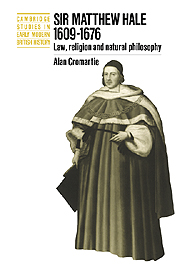Introduction: a summary life
Published online by Cambridge University Press: 05 May 2010
Summary
‘That incomparably learned, upright man and just’ Sir Matthew Hale, Chief Justice of King's Bench, was born on 1 November 1609, at the village of Alderley in Gloucestershire. By the time of his death, on Christmas Day of 1676, he had come to embody an ideal of piety and probity and learning. He was ‘good Sir Matthew Hales’, ‘the just and pious … Hales’, ‘that excellent good man’, a figure whose reputation, in itself, would justify a study of his career. This introduction will set out, as economically as possible, the facts of the life that occasioned this chorus of praise.
The little that is known about Hale's background suggests it was respectable, but socially entirely unpretentious. The nearest town to Aiderley was Wotton-under-Edge, a centre of the clothing trade just under the scarp of the Cotswolds. The effective founder of his family was a clothier of Wotton, a certain Robert Hale, who left £ 10,000 between five sons. This character's only mark on local history had a certain symbolic appropriateness, given the nature of his grandson's fame; he was thrown off a jury, in 1573, for refusing to have any part in a false declaration. His second son, also a Robert (?1563–1612), was educated at Broadgates Hall in Oxford, matriculating in April 1580, and was called to the bar, at Lincoln's Inn, in February 1594. He married Joan Poyntz of Alderley in 1599, and built the house at Alderley where his only child Matthew was born.
- Type
- Chapter
- Information
- Sir Matthew Hale, 1609–1676Law, Religion and Natural Philosophy, pp. 1 - 8Publisher: Cambridge University PressPrint publication year: 1995



